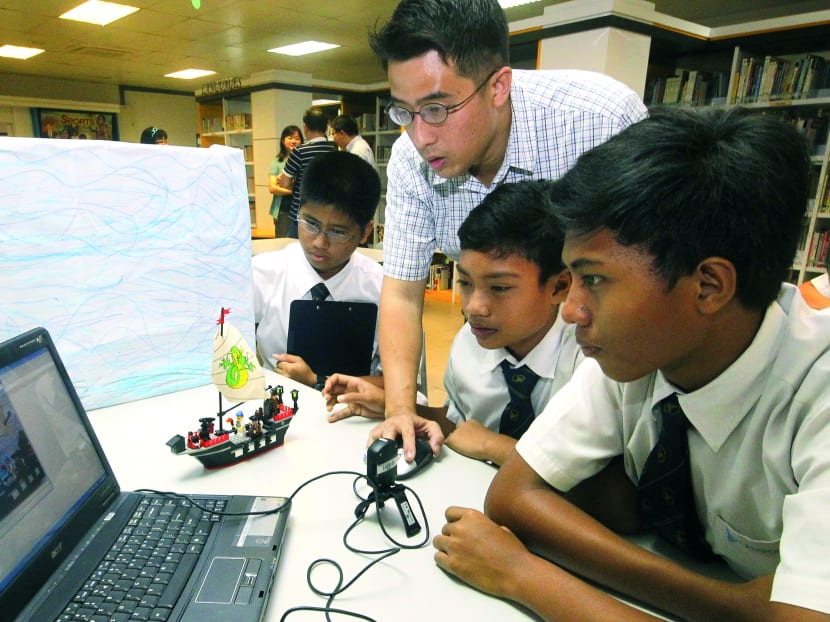S’pore can do better in ensuring educational equity
SINGAPORE — The Republic has a high-quality education system, but it can do better in ensuring equal education opportunities for students, regardless of their socio-economic background, said the man behind the most influential global scorecard for education systems around the world.

Students from Bendemeer Secondary School with a teacher. Pupils from disadvantaged backgrounds in Singapore are doing well academically, with the Republic ranking fifth out of 65 countries. PHOTO: Ernest Chua
SINGAPORE — The Republic has a high-quality education system, but it can do better in ensuring equal education opportunities for students, regardless of their socio-economic background, said the man behind the most influential global scorecard for education systems around the world.
The triennial Programme for International Student Assessment (PISA) test assesses 15-year-olds’ mathematics, science and reading skills.
The PISA scores published last week by the Organisation for Economic Cooperation and Development (OECD) showed Singapore’s students came in among the top three in all of the test’s areas.
Both academically weaker and stronger pupils did better, compared with the batch who took the previous test in 2009 — the first time the Republic participated in PISA.
In a phone interview with TODAY, OECD Deputy Director for Education and Skills Andreas Schleicher noted that Singapore is “a strong performer in (education) quality, but only an average performer in equity”.
“The relationship between social backgrounds and learning outcomes is about average,” he said.
On factors accounting for this, Mr Schleicher pointed to streaming in schools here, but stressed that the solution is not to scrap the practice. Instead, it is about tailoring lessons more to suit the learning pace and needs of each child, he said.
Social mobility has been a hot-button issue here, with some expressing concerns that the better-off in society are getting more opportunities.
Last week, Deputy Prime Minister Tharman Shanmugaratnam weighed in on the topic, noting that the Government is intervening upstream, earlier in children’s lives.
PISA defines equity in education as “providing all students, regardless of gender, family background or socio-economic status, with similar opportunities to benefit from education”.
The OECD report noted that grouping higher-achieving students together limits learning between under-achieving students and those with higher abilities. It added that students depend on their parents’ resources when they are younger, and well-off families may be in a better position to help their children do well in systems that stream pupils early on.
Mr Schleicher reiterated that there are no trade-offs between academic excellence and equity, citing examples such as Japan’s education system.
“You will never succeed in getting all students to (achieve) the same test score … but education systems should succeed to ensure students’ success should not depend on their social background,” he said, pointing out that economies will be affected if students do not reach their full potential.
Nevertheless, Mr Schleicher said Singapore has helped disadvantaged students reach “very good” standards internationally. He also cited the high proportion of “resilient” children here: The Republic was ranked fifth out of 65 countries for its share of students who overcame disadvantaged backgrounds to do well academically.
The Ministry of Education (MOE)’s spokesperson also said the PISA data show Singapore is “comparable to the OECD countries as a whole”, in terms of the impact of socio-economic background on performance. Having the fifth-highest proportion of “resilient” pupils globally means “many of our students from a less privileged home background are performing way above what their circumstances would otherwise predict, regardless of the schools they attend”, said the spokesperson.
“As Mr Schleicher has pointed out, Singapore has fared well in helping students from disadvantaged socio-economic backgrounds,” she added.
Education expert Ng Pak Tee said the Republic is “not doing too badly” in terms of ensuring equity in education. Still, there is “room for improvement”, said the head of the Policy and Leadership Studies Academic Group at the National Institute of Education. He also noted that the PISA only assesses students on certain subjects.
“Every school is a good school (but it) does not mean that every school is the same (or does equally well in a certain subject area),” he said in an email interview. “Not every student has the same talents.”
Boston College’s Professor Dennis Shirley, who has studied Singapore’s education system, said he had been “impressed with the high quality of provision” of resources here, even in schools that are serving “relatively disadvantaged” groups. While East Asian cities and territories dominated the top spots in the PISA test, Dr Shirley felt that egalitarian systems — which are more prevalent in Western countries — have a “strong and perhaps even leading role in the future”.
“Systems like (those in) Shanghai and Singapore have many strengths,” said Dr Shirley. But their Achilles’ heel is that students are not encouraged sufficiently to develop wildly creative ideas that could lead to the kinds of breakthroughs that have created the great technological advances of recent years.”






